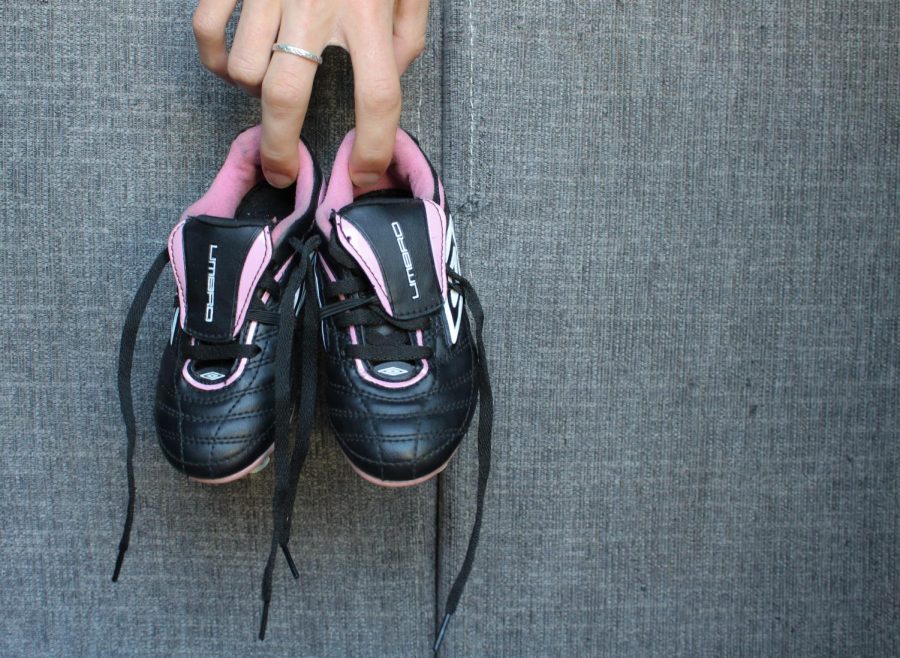Brown: Parents Should Encourage Little League Sports
Children’s soccer shoes are held in a residential house in Salt Lake City, Utah on Tuesday, September 14, 2021 (Photo by Brooklyn Critchley | The Daily Utah Chronicle)
September 16, 2021
Little league sports paint the image of overly passionate parents who take things a little too seriously. Whether parents are yelling at teenage umpires in baseball or constantly talking down at their kids after the game, these parents stray far from the values of little league sports.
Little league sports are an escape for children — a place to spend pent-up energy. Regardless of what sport is being played, little league sports provide the benefits of exercise, discipline and teamwork for kids. All parents should give their children this opportunity.
One of America’s scariest health problems has been obesity. And leaders have done a lot to curb its effects. Famously, Michelle Obama led a campaign during the Obama administration to provide children with healthier school options and encourage exercise. Still, the problem is increasing in children. Obese children are much more likely to face harsh health consequences down the road.
According to the CDC, nearly 20% of children in America are obese. While healthier school lunches may help reduce this percentage a little, exercise has shown to increase lean body mass, improve energy expenditure and lead to better appetites among children.
But, obviously, it’s not effective to send your kid to run around the block three times and call it a day. Kids need a fun, engaging activity, and although some like sports more than others, most kids would agree that playing a game of soccer is more fun than running on a treadmill.
Obesity numbers in America are staggering. By making sure children get adequate exercise at a young age, parents are setting them up for a healthier future.
One of the more important values to teach children in their adolescence is the value of discipline. Learning from mentors in pursuit of a goal is a trait that leads to success in life.
Having played baseball and football growing up, I credit most of my current work ethic to the hours I dedicated to those sports. Sports taught me that success is not easy, and only time gets you closer to achieving your goals.
Spending energy, time and emotion in pursuit of the end goal — whether it be a championship, a winning record or even just a fun season — is often not an easy thing to do and may not be as fun as some expect. But when those goals are achieved in sports, it shows children that good things often come with hard work.
There are real benefits to effort. Working hard at a job may result in a promotion, or working hard on relationships could lead to real, valuable friendships.
By introducing simple sports to children at a young age, they’re introduced to basic skills and facets of the game that make them much more likely to stick with the game for longer. According to the Aspen Institute, children who play sports are eight times more likely to play sports as young adults. These valuable lessons must be taught from a young age.
While considering teamwork as a benefit of little league sports is rather cliché, it’s very important nonetheless. However, teamwork means different things at different ages. In a child’s early days of playing sports, teamwork may just mean kicking a ball around and socializing with other kids. Of course, there’s nothing wrong with that. But the real benefits of teamwork come when sports start to get competitive.
As a child grows into this more competitive age, the childhood concept of a team is replaced by a more mature definition. There are rarely players that can dominate, and the teams that win are the teams with chemistry.
Giving it your all while knowing that all your teammates around you are giving it their all is a special feeling. Hours of blood, sweat and tears towards a common goal leads to greater trust, better friendships and bonds that are hard to find elsewhere.
When kids take these values into life, even if they aren’t becoming the next Tom Brady, it could easily lead them to a more valuable and rewarding future. There are almost no fields of work, relationships or hobbies that rely on individual success, so by learning the value of teamwork children are primed for success.
As much as little league parents may want you to think it, kids being the greatest at their respective sport is not the goal. Instead, the goal is to teach valuable lessons for life while getting in the exercise that’s vital for a child’s health.
By getting your child involved in team sports, whether it’s basketball, football or gymnastics, they are learning the essential values of discipline and teamwork, all while being set up for greater health in the future.









